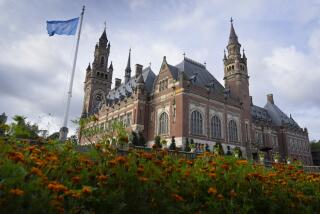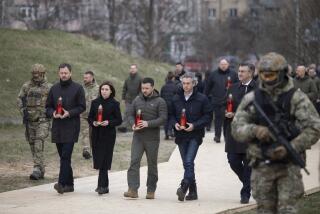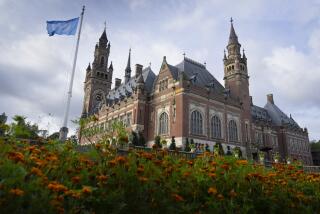Compelling Case Seen Against Milosevic
- Share via
THE HAGUE — After 95 days of testimony, 300 exhibits and 124 witnesses, prosecutors in the United Nations war crimes trial of former Yugoslav President Slobodan Milosevic on Wednesday rested the portion of their case dealing with the massacres and deportation of ethnic Albanians in Kosovo.
Despite the absence of evidence directly linking Milosevic to atrocities, prosecutors and some trial-watchers contend that a compelling case has been constructed that he was aware of a high-level Yugoslav campaign to “ethnically cleanse” Kosovo of its Albanian population and that he participated in a cover-up.
Prosecutors have staked much of their case on “command responsibility,” meaning that Milosevic, as president and head of the armed forces, knew what was happening in Kosovo, or should have known, and did nothing to prevent it.
The destruction of villages and the forced exodus of Albanians were stepped up across Kosovo--a province of Serbia, the main Yugoslav republic--on March 24, 1999, the same day that the North Atlantic Treaty Organization unleashed airstrikes against Yugoslav forces.
That led prosecutors to argue that a directed and premeditated plan was underway.
Prosecutors brought forward several foreign witnesses, including European Union envoy Paddy Ashdown, who testified that he told Milosevic during the war what troops were doing in Kosovo.
Letters were introduced from the former chief U.N. war crimes prosecutor, Louise Arbour, in which she repeatedly warned Milosevic that he risked prosecution for war crimes if he did not rein in Serbian troops in Kosovo.
Concerning a cover-up, prosecutors presented a signed statement earlier this month from a former Yugoslav secret service chief stating that he was present at a meeting at which Milosevic gave an order to remove bodies of civilians killed in Kosovo.
Milosevic will have a chance to present his defense after the prosecution has completed its case.
More to Read
Sign up for Essential California
The most important California stories and recommendations in your inbox every morning.
You may occasionally receive promotional content from the Los Angeles Times.










